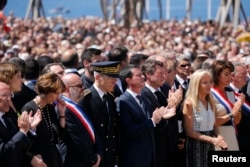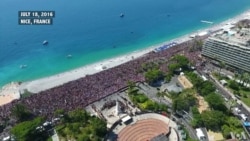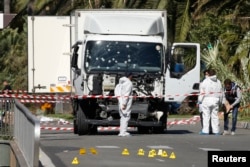The man who killed 84 people in the Bastille Day attack in the French seaside city of Nice had expressed his interest in radical Islam, according to the Paris prosecutor.
Francois Molins, who oversees terrorism investigations, said Monday slain attacker Mohamed Lahouaiej Bouhlel had showed support for the Islamic State group and searched online for information about the Orlando attack on a gay nightclub.
Molis says Bouhlel also made reconnaissance visits to the beachfront where he used a rented truck to run down dozens of people on Nice's main promenade.
Moment of silence
On Monday, silent tributes were held across France in honor of the victims of the July 14 attack.
Prime Minister Manuel Valls was booed as he joined thousands in Nice for a moment of silence.
Jeers could be heard as Valls and other politicians departed, with several people in the crowd shouting at them to resign.
WATCH: Nice holds moment of silence for attack victims
Opposition parties have accused Hollande's government of not doing enough to combat terrorism.
In Paris, French President Francois Hollande and Interior Minister Bernard Cazeneuve also held a minute of silence to honor the victims.
Hollande has ordered a three-month extention of France's state of emergency which was set to end later this month. He has also enacted Operation Sentinel, introduced after terror attacks in January 2015, that allow 10,000 extra military personnel to boost the ranks of security forces across the country. Hollande has said that France will strengthen its roles in Syria and Iraq, saying, "We will continue striking those who attack us on our own soil."
Thursday's slaughter was the third major terrorist attack in France since last year. A coordinated attack in Paris on November 13 killed at least 130 people in a strike claimed by Islamic State, and a series of attacks in January 2015 that began with an assault on the offices of the satirical magazine Charlie Hebdo killed 17 people.
The Islamic State terror group has claimed responsibility for the latest incident. A statement published in an IS media outlet called the attacker a "soldier."
Bouhlel, who lived in Nice, was suspected by local police to have committed criminal offenses. In March, he was given a suspended, six-month sentence for armed violence that took place in January.
Relatives living in Tunisia told news agencies that he had psychological problems before leaving for France in 2005. His father said Bouhlel had problems from 2002 to 2004 "that caused a nervous breakdown."
Some material for this report came from AFP and Reuters.









